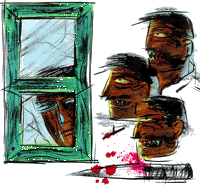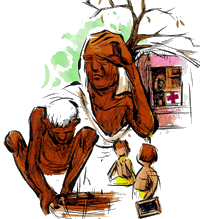Commentary/Dilip D'Souza
Hope, Where You Look For It
 Afriend in Austin, Texas, sent me an e-mail after reading my columns
in these virtual pages. I suppose the gloom and doom I wrung
my hands about in those columns must have alarmed her.
For she wrote, " Wow, do you ever get overwhelmed? Do you
think you will see any changes (for
the better) in your lifetime?"
Afriend in Austin, Texas, sent me an e-mail after reading my columns
in these virtual pages. I suppose the gloom and doom I wrung
my hands about in those columns must have alarmed her.
For she wrote, " Wow, do you ever get overwhelmed? Do you
think you will see any changes (for
the better) in your lifetime?"
I thought about her e-mail for a long time after I read it. No,
I don't get overwhelmed. Yes, I think I will see changes.
So I asked myself, ' Are there things in my country that offer hope?
Is the situation quite as gloomy as I made my friend think with my columns?'
The answers I came up with: A yes and no, respectively. And that's
the reason for this column. For you in Austin, yes, but more for me chosen
at random, here are just two things that give me hope for my country.
On August 17, the high court in Bombay gave an order to the state of Maharashtra's
Criminal Investigation Department in a case the CID was investigating.
I am tempted to use quotes, to write 'investigating,' but I will desist.
This is, after all, a column about hope. Anyway, the order says
that the CID officer assigned to the case must report directly to the high
court. He must send a progress report in a sealed envelope to the high court
every Wednesday.
To understand why this is such a significant development, you
need to know a little about this case.
One evening in late July, a man called
Ramesh Kini was found dead in a cinema theatre in Pune, during the late
show of Broken Arrow. Kini was a tenant in a ramshackle building
in central Bombay.
Now if you know anything about Bombay, you will not be surprised
to know that Kini's landlord, Laxmikant Shah, was trying to get Kini out
of the flat. Trying to evict tenants has become almost the prime function
of landlords in this city. For tenants rarely leave rented premises
voluntarily. The laws and the backlog of cases in our courts favour
them.
The infamous and quite foolish Rent Control Act prevents landlords
from raising rents. Tenants pay the same rent for decades. Real estate
is so expensive in the city that they cannot think of moving. So if
the landlord wants his flat back, he cannot get it easily. Thus, he often resorts
to threats and violence to get rid of his tenants. So it was with Kini and Shah.
Now let's add some spice to this equation. Shah is a close friend
of Raj Thackeray, Bal's nephew. Bal Thackeray, of course, is the
supremo of the Shiv Sena, the party now in power in the state. Raj is, The
Nephew, a man of sudden, growing and completely undeserved power.
After Kini was found dead, his wife Sheila told the press and the police that
her husband was regularly threatened by Shah, Raj Thackeray and another
Sena man called Ashutosh Rane. On that morning in July, she said, Ramesh
had left home saying he was going to the Shiv Sena office. The next thing
she knew was that he was found dead in Pune.
Shah and Rane were arrested. The Nephew was questioned by the
CID. After he went in for that questioning, his uncle growled a warning to the
Government in his party's scurrilous rag, Samna (Confrontation).
Almost within the hour, the state's chief minister got up in the state assembly
to make the incredible announcement that Raj Thackeray was completely
innocent in the case. Can you recall the head of any other government
publicly pronouncing the innocence of an accused? Neither can I. It's all
happening in Maharashtra under the Shiv Sena. Except that nothing further
has happened to The Nephew. And Shah
and Rane are both out on a measly bail that must have been no more than pocket
change to them.
These events should be enough to raise substantial doubts in your
own mind about the investigation the CID will be able to conduct
into Ramesh Kini's death. So far, not so good. So far, no progress either.
But the high court has evidently had the same doubts that are
swimming around in your brain. The judge's order shows that the court is
sometimes willing to step in and take action when the government evades
doing so.
 I'll admit, it's not ideal. I don't want my government run by
the high court. But in a time when the guilty are regularly let off without
punishment, the high court's order offers at least a faint hope
that Ramesh Kini's death will see justice done. Hope that you will not be
allowed to sidestep the law just because you're The Nephew or The Niece or
The Uncle's Brother-In-Law's Second Cousin Twice Removed from his flat.
I'll admit, it's not ideal. I don't want my government run by
the high court. But in a time when the guilty are regularly let off without
punishment, the high court's order offers at least a faint hope
that Ramesh Kini's death will see justice done. Hope that you will not be
allowed to sidestep the law just because you're The Nephew or The Niece or
The Uncle's Brother-In-Law's Second Cousin Twice Removed from his flat.
Hope that the guilty will be punished.
That's one kind of hope I'm talking about.
Ifound hope of a completely different kind in Koinpur. This small
hamlet high in the hills of Orissa, is the kind of place honeymoons should
be. The hills all around are a lush green, the birds sing, the stars are
dazzling, the rain clouds descend majestically off nearby Mahendragiri, the
tallest peak in the area. On long walks, your only company is the sound
of your breathing.
Sounds lovely? Actually, the whole picture is considerably less
idyllic. Surrounding Koinpur are a few dozen Saora tribal villages. Saoras
are like tribals all over the country. Truly, the forgotten people of India.
Most of their remote villages can be reached only on foot after tough
treks. They have no schools, no hospitals. The government dispensary in Koinpur,
the only remote medical facility that would have been available
to thousands of Saoras, is staffed by a compounder. Its shelves are never burdened
with such inconveniences as medicines.
One morning in nearby Bada Deula village, we met Malti and Deenabandhu,
a young tribal couple whose two-and-a-half-month old son had a mysterious
high fever. Two days earlier, that compounder had 'prescribed'
an expensive multi-vitamin tonic that was only available in the plains, a day's
hike away. Their friend, who set out to get it was too late returning -
the boy died that morning. Not that the tonic would have helped anyway.
Such is life, and death, in and around Koinpur.
But Koinpur is also home to an outpost of an Orissa non government organisation. Thanks
to them, there's a residential school for tribal children; a cane furniture
factory; nurseries that raise saplings for reforestation of the hills;
even a small dispensary. Workers are trained in the basics of health and fan
out into the tribal settlements to apply their training. Young women run
balwadis -- like day-care centres for kids whose parents
are out at work all day. At these balwadis,kids can count
on at least one hot, nutritious meal in the day.
The man who coordinates the Koinpur project for the NGO gave up
a promising marketing career to come here. He and his staff run an efficient
operation that is making a definite difference to Saora lives. The cane
factory's tribal-made furniture attracts customers from hundreds of miles
away. You only have to look at the lush hills, so different from the bare
mounds elsewhere in the state, to know how spectacularly reforestation
has worked.
The school is doing so well that it will need a new building soon.
And perhaps best of all, the Saoras in the area are showing signs
of better health.
It was only when I returned home from Koinpur that I realised
why I had been so exhilarated there. In those rain clouds drifting off Mahendragiri,
in the fragrance of the air, in the faces of those school children
-- I had seen the same thing in them all.
Hope.
Different from the hope offered by a high court, but hope
nevertheless. So why on earth should I get overwhelmed?
Illustrations: Dominic Xavier
Dilip D'Souza contributes a fortnightly column to these pages.
|





 Afriend in Austin, Texas, sent me an e-mail after reading my columns
in these virtual pages. I suppose the gloom and doom I wrung
my hands about in those columns must have alarmed her.
For she wrote, " Wow, do you ever get overwhelmed? Do you
think you will see any changes (for
the better) in your lifetime?"
Afriend in Austin, Texas, sent me an e-mail after reading my columns
in these virtual pages. I suppose the gloom and doom I wrung
my hands about in those columns must have alarmed her.
For she wrote, " Wow, do you ever get overwhelmed? Do you
think you will see any changes (for
the better) in your lifetime?"
 I'll admit, it's not ideal. I don't want my government run by
the high court. But in a time when the guilty are regularly let off without
punishment, the high court's order offers at least a faint hope
that Ramesh Kini's death will see justice done. Hope that you will not be
allowed to sidestep the law just because you're The Nephew or The Niece or
The Uncle's Brother-In-Law's Second Cousin Twice Removed from his flat.
I'll admit, it's not ideal. I don't want my government run by
the high court. But in a time when the guilty are regularly let off without
punishment, the high court's order offers at least a faint hope
that Ramesh Kini's death will see justice done. Hope that you will not be
allowed to sidestep the law just because you're The Nephew or The Niece or
The Uncle's Brother-In-Law's Second Cousin Twice Removed from his flat.